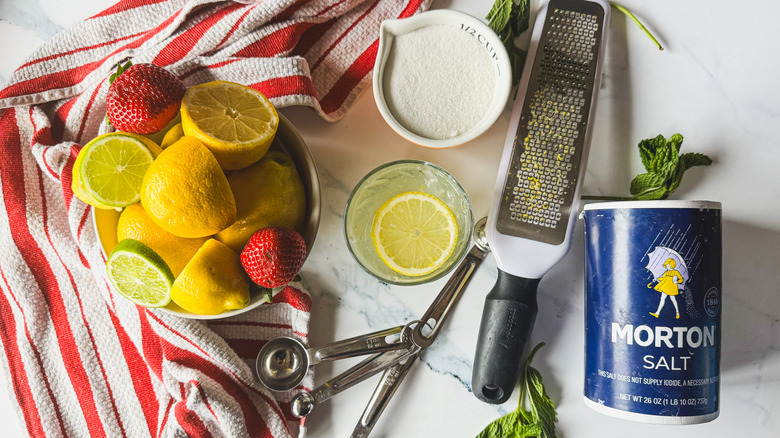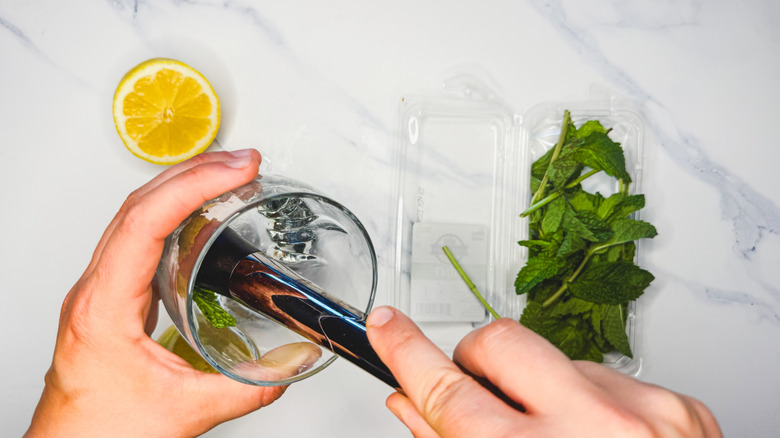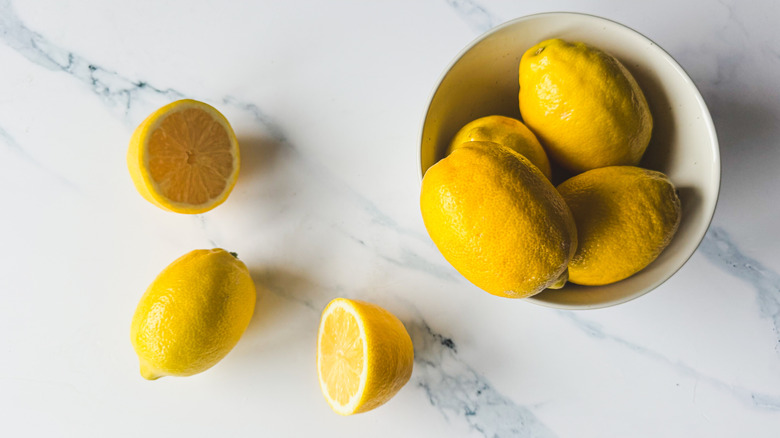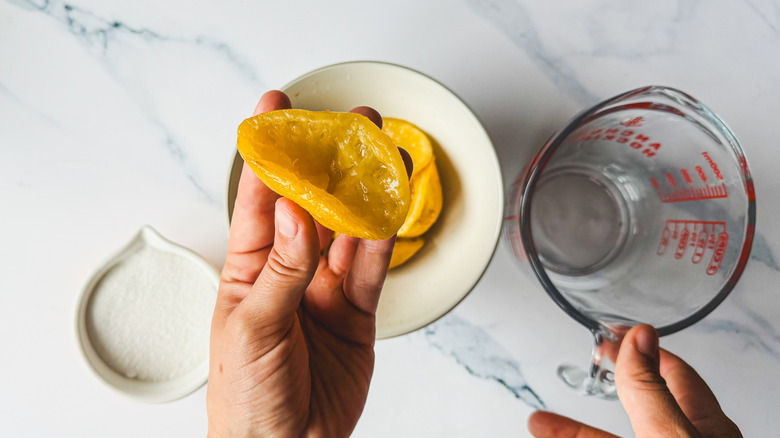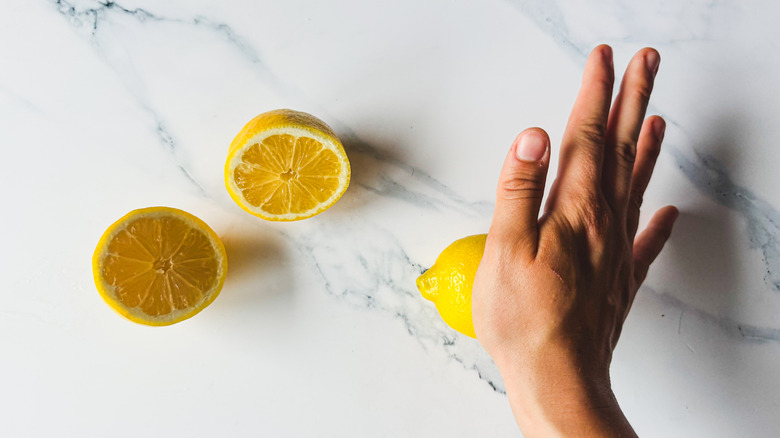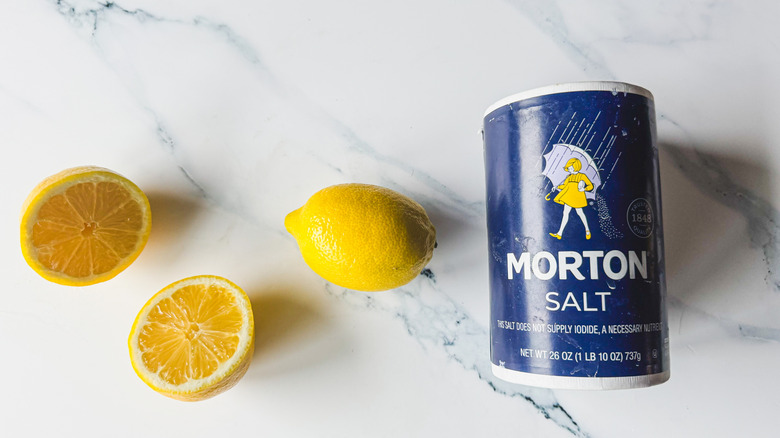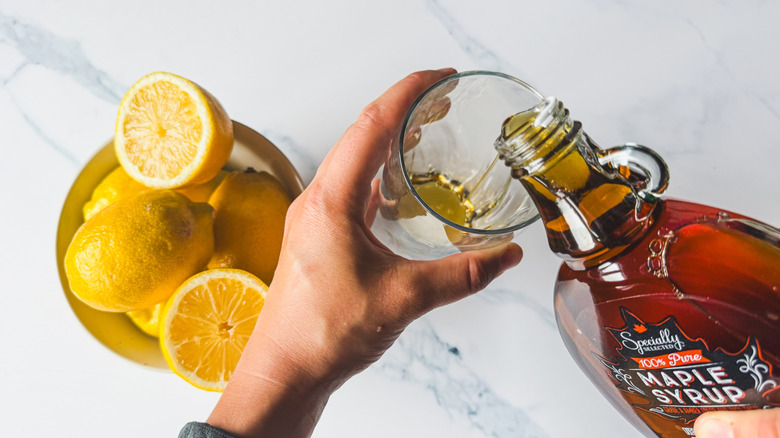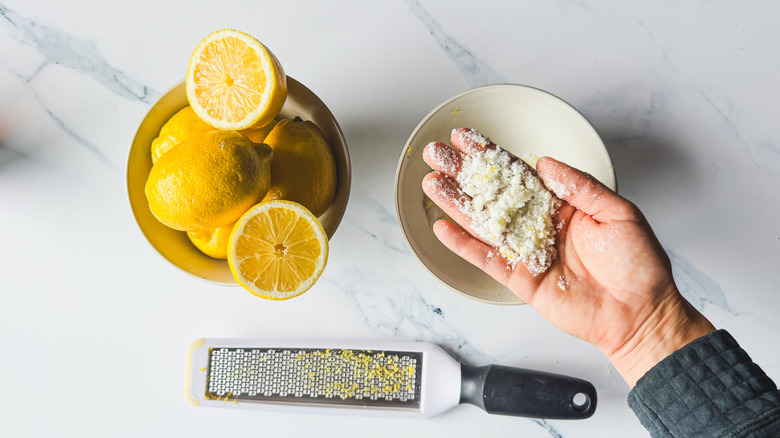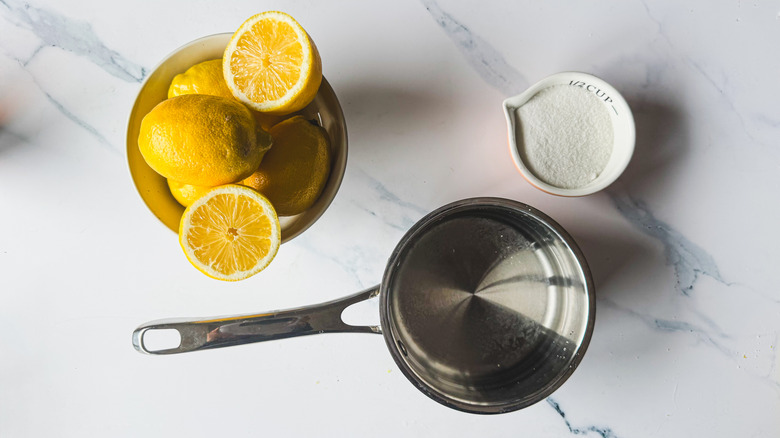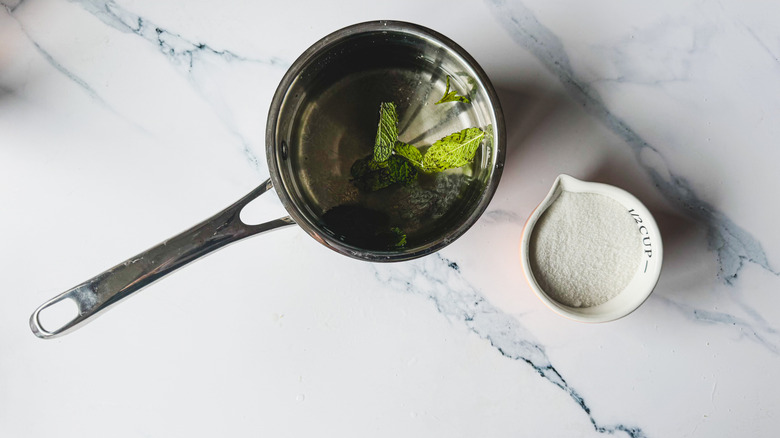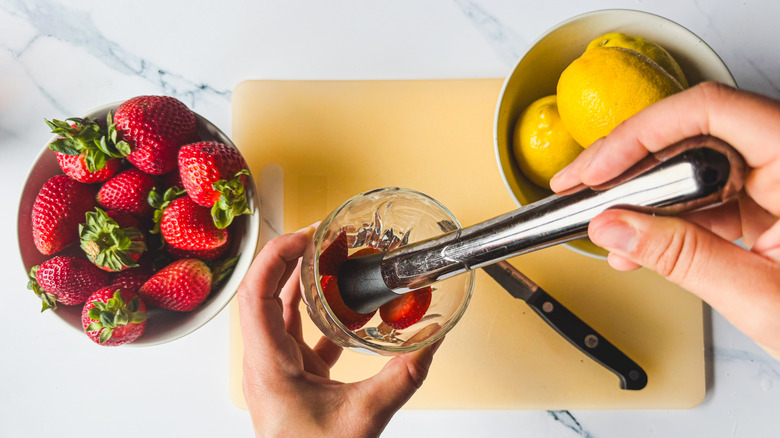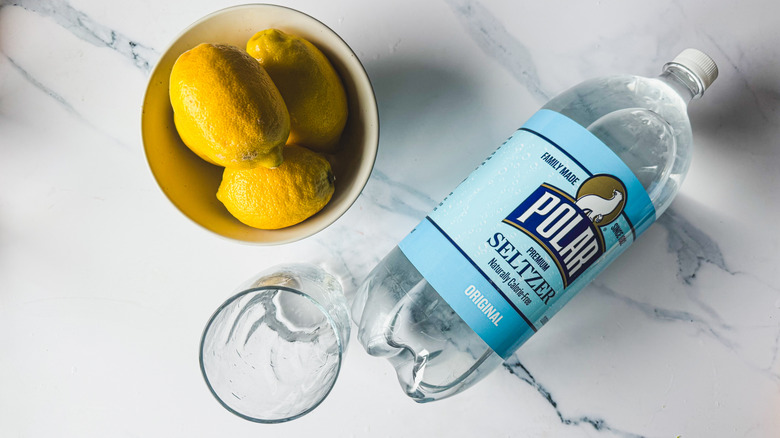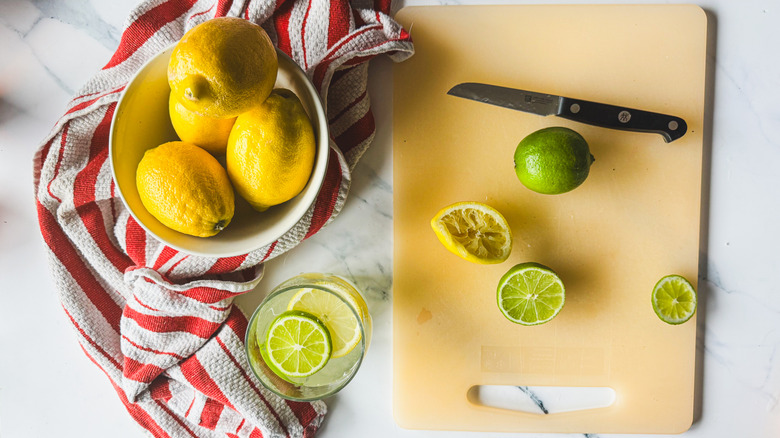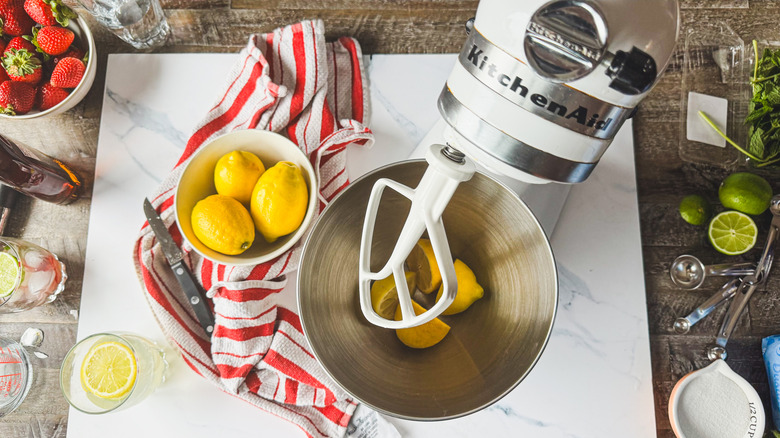14 Tips For Making The Best Lemonade You'll Be Drinking All Summer
Lemonade is like summer in a glass. Not only is the chilled drink, which is best served with copious amounts of ice, super refreshing on a sweltering summer afternoon, but the harmony of flavors — the tart lemon juice and the sweet sugar — conjures up a deep nostalgia for many. Maybe it brings back memories of visiting the state fair or setting up a lemonade stand on the corner of your childhood home's driveway. Lemonade is a beloved beverage for many reasons, but that doesn't mean that it's always given the attention it deserves.
If you've lived your life thus far off store-bought lemonade, or worse, Crystal Light, you probably haven't been doing lemonade justice. While its recipe is seemingly simple — a combination of sugar, water, and lemon juice — there are many ways that it can be upgraded and improved on to make it more refined, yet still as refreshing as you remember it. We've rounded up our top tips for making tasty lemonade and done our own experimenting to see how big an impact these simple hacks have on such a timeless beverage.
1. Try muddling herbs into your lemonade
A muddler is an essential component of any mixologist's toolkit, and it turns out that it also comes in handy for making lemonade. Muddling — mashing herbs (or some other ingredient) into a glass with a liquid — can help extract their essential oils, giving you a more profound flavor than if you just tossed a couple of mint springs into your drink. You can muddle your herbs right in glasses, then pour your lemonade right on top.
There are so many different fresh herbs that you can use to elevate your lemonade, and it really all depends on what flavor profile you're after. Mint, for example, will offer a refreshing flavor that will cleanse your palate, making every sip more refreshing than the last. Another summer favorite is basil; the subtle, anise undertones of the herb work well with the citrusy punch of the lemonade. You can even use purple basil instead of the green variety to give your drink some extra color. If you're not afraid to try new flavors, try a thyme or rosemary-infused lemonade — preferably with honey added instead of sugar. While these two herbs are often reserved for cooking, they will add a bright flavor to your glass of lemonade and help balance out its acidity.
2. Always use fresh lemons
You'll find no shortage of tips for making lemonade on the internet. While some recipes suggest that you can use lemon extract or lemon juice concentrate, homemade lemonade is simply not a place where you want to cut corners. You'll want to stock up on high-quality, fleshy lemons to make your batch. Freshly squeezed lemons simply have a much brighter and fresher flavor than bottled products or extracts, which is exactly what you're craving on a hot summer day — not a drink that tastes stale.
It's relatively easy to find good lemons for juicing at the store, as long as you know what to look for. The skin should look shiny, yellow, and bright without any visible signs of wrinkles or soft spots. If you're buying single lemons, try to opt for heavier ones, as they have more juice than lighter ones. We'd also recommend picking them up and giving them a little squeeze; they should have some give to them. Lemons that are hard and solid may not have as much juice. You can also lean in and give them a good sniff — you're looking for a bright, citrusy, and, well, lemony odor.
Lemons keep relatively well, so you can buy a bag and make lemonade at your leisure. Keep them in the fridge, away from ripening fruit like apples and bananas, and use them within a month.
3. Try roasting your lemons to increase their flavor
The last thing you probably want to do on a summer day is turn on your oven. But, if you want to make a truly delicious pitcher of lemonade, you may have to bite the bullet, crank up the air conditioning, and roast your citrus beforehand.
It might seem a little excessive, but we can tell you from personal experience that roasting your lemons actually makes for better lemonade — and it makes your kitchen smell fantastic, too. If you like a lemonade that is sweet and complex, rather than tart and pithy, this hack is for you. It will make those sweet notes more prominent, which can cut back on the amount of sugar you need to add to your recipe later on.
You'll want to make sure you remove any SKU stickers from your citrus before cutting them in half and placing them flesh-side down on a baking sheet. The exact bake time will depend on the size of your fruit, but when we tried it for our recipe, we baked our citrus at 400 F for about 25 minutes, until the edges started to darken. The fruit easily gave up its juice and had an almost caramelized undertone.
4. Roll your lemons on the counter to make them juicier
There's nothing more disappointing than getting your hands on what you think would be a juicy lemon, slicing it open, and squeezing it with all your might, only to ask, "Is that all I get?" when you see how much juice is in your pitcher. But once you try this simple lemon hack, you'll never have to worry about this disappointing scenario happening to you ever again.
Rolling your lemons out on the counter like a rolling pin might seem a little odd, but it genuinely helps extract more juice from the citrus. This is because the rolling action makes it easier to squeeze and breaks the juice pods, making it easier to extract. You can also carefully stab the cut side of the fruit with a fork and slowly rotate it, holding the fruit in your other hand, to help break those pods and get the most bang for your buck. This method only takes a couple of extra seconds, and it will drastically increase the amount of juice you get from your fruit.
5. Add a pinch of salt to enhance the sweetness
If you're a big fan of salt on cookies, you're going to want to try this hack for yourself. The next time you whip up a batch of lemonade, try adding a pinch of salt to it to enhance its flavor. The salt will help block out some of the natural bitter, pithy flavor of the lemons and also draw attention to the sweetness of the beverage. You may even notice that it brightens the citrusy punch, too.
The key is not to add too much salt to your recipe. Everyone's tolerance for salty-sweet things is different, and you still want your lemonade to be refreshingly sweet, rather than send you running for a glass of water. If you are just trying to get your footing, start with a pinch, and eventually scale upward to 2 teaspoons of salt per cup of sugar.
6. Use a sweetener other than sugar
The classic formula for lemonade is simple: lemons, water, and sugar. But that doesn't mean you should only be looking to sugar as a source of sweetness in your beverage. There are tons of sweeteners you could turn to instead, including two that you may already have in your pantry: maple syrup and honey. Maple syrup will add a subtle oakiness to your beverage, making its flavor more complex than if you used sugar alone. Honey's flavor varies based on the type you're using, but in general, you can expect it to have a floral, herbaceous flavor with plenty of sweetness to go around. You may even be able to find a honey that will impart a delectable aroma to your lemonade, like lavender honey.
On that note, it's important to be cautious with how much of these sweeteners you add to your beverage, as they are often much sweeter than the table sugar used in most lemonade recipes. You can use about half the amount of honey as you would sugar and ¾ cup of maple syrup for every cup of sugar in your lemonade recipe. However, this is relative, and since lemonade can really be made to your liking, you can always add less sweetener than you think you'll need and adjust from there. It's easier to add more sweetener than it is to try and rebalance the water and lemon juice in your recipe.
7. Mix together lemon peels and sugar
Have you ever sipped on a lemonade that wasn't ... lemony enough? It's a flavor that's hard to describe, and honestly, it can be pretty devastating going in expecting a punchy lemon flavor and getting a glass that tastes like flat, extra-sugary lemon seltzer. Rather than just add more lemon juice, which will only make your drink more tart, try rubbing together lemon zest with your sugar. You can use the zest of one lemon for each ½ cup of sugar. Rubbing the sugar together with the zest will help release some of the oils, in turn making your lemonade more fragrant and lemony. That said, if you add your zest and sugar mixture straight to the lemonade and give it a stir, you will suck up the occasional piece of zest in your straw. To avoid this, try using a vegetable peeler to get long strips of lemon peel, rub it with the sugar, and either toss the peel out before adding the sugar to the rest of the lemonade ingredients or just letting it sink to the bottom of your glass.
If you do try this hack, you're going to want to avoid getting too much of the pith — the white part of the lemon — as it can make your drink too bitter. Just take off the exterior yellow skin of the lemon using a zester, peeler, or even a box grater.
8. Use a simple syrup to prevent a gritty lemonade
If you've ever made homemade lemonade or iced tea with granulated sugar, or had a run-in with a poorly made Dunkin' iced coffee, you may know the sensory shock of getting a mouthful of crunchy sugar crystals when you suck your beverage up with a straw. Not only is it unpleasant in the moment, but it also means the sweetener is not evenly distributed in your beverage.
The easiest way to avoid this is to add a simple syrup to your lemonade instead of opting for straight sugar. Sure, it requires a little more foresight, but if you're making a batch of the syrup already for your cocktails or coffees, it makes this labor of love a little more worthwhile. It's never worth buying simple syrup at the grocery store, seeing as it only calls for two ingredients — equal parts sugar and water — boiled together on the stovetop until the crystals dissolve and it reduces just a little. You don't want it to reduce too much, as it can lead to an acrid flavor. Once the syrup has adequately cooled, it can be poured into your lemonade. You'll want to use ¼ ounce of syrup for each teaspoon of sugar. Depending on how sweet you like your lemonade, you could be using around a cup of simple syrup for each cup of lemon juice.
9. Infuse flavors into your simple syrup
Another benefit to making your own simple syrup for your recipe, rather than adding sugar to the pitcher, is that you can infuse it with different ingredients and flavors. If you like a more subtle hint of mint or basil, for example, you may want to try adding a couple of sprigs of herbs to your simple syrup as it's boiling, then strain them out before you chill it. The flavor is less punchy than if you muddled the herbs in the bottom of your glass. You can also add some ginger root to your syrup for a little more of a spicy burn that meshes well with the tart lemon juice.
Herbs aren't the only way you can go with your syrupy concoction. For a subtle fruity hint, consider adding a handful of raspberries or blackberries to your syrup and straining out the seeds before serving. One of our underrated favorites is peach simple syrup, which is a great way to use up ripe fruit after a trip to the orchard — and get some tasty lemonade out of it, too.
10. Muddle berries with your lemonade to give it a unique fruity flavor
Fruit is a very logical direction to take your lemonade, seeing as there are very few fruits that don't go well with lemonade. In the summer, a crisp, chilled glass of lemonade with some strawberries, blueberries, and/or raspberries floating in it is not only a great way to give your glass a visual facelift, but also to enhance its flavor and aroma. If you really want to pull those flavor notes out of the fruit, try muddling it in the glass before you add your lemonade. For a fun visual effect, try perching your fruit on the rim of your glass, or use frozen fruit for a cheaper and tastier substitute for ice.
Another fruit that works well in lemonade is watermelon. Blend your chilled melon and pour in your lemonade for a refreshing sipper, perfect for enjoying poolside.
11. Substitute water with something fizzy
Syrupy beverages tend to be heavy on the palate, which is why adding a little bit of carbonation is a simple yet effective way to lighten up your sip. The effervescence will make it extra refreshing on a hot summer day, especially paired with a handful of fresh ice cubes and a little umbrella on top.
There are many different kinds of bubbly drinks worthy of adding to your lemonade. If you don't want to alter the flavor profile of your beverage too much, stick to cold seltzer. It's bubbly and won't dilute or alter the sweetness of your drink. Lemon-lime soda, on the other hand, will give you a citric acid tang and can replace some of the added sugar. You can also use club soda for your lemonade — just steer clear of tonic water, as its quinine bitterness will disrupt the entire profile of your drink.
The only real drawback to using a bubbly drink to replace the water in your lemonade is that you can't make it ahead of time, otherwise it will taste flat. If you go this route, you may want to try making a lemonade concentrate with lemon juice and simple syrup so that you can add your bubbly right before you're about to serve it.
12. Freeze some lemonade ice cubes to cool down your drink
On a hot summer day, the ice in your glass of lemonade will melt faster than you want it to. While there's something very satisfying about sipping your drink out of a condensation-covered Mason jar, after a while, the ice will dilute your beverage — resulting in a watered-down sipper that tastes more like sweetish, lemon-flavored water than lemonade.
Instead of using regular ice cubes to cool down your drink, try freezing some lemonade in an ice tray ahead of time. As the cubes melt, they will diffuse that lemon flavor and sweetness into your drink. Just be sure to allow adequate time for your ice cubes to set in the freezer, as adding sugar into the mix will lower the freezing point of the liquid — meaning it will take more time for your cubes to harden than if you used water straight from the tap.
13. Pair different kinds of citrus juice together
Lemonade is a great beverage, but so is limeade, orangeade, grapefruitade (is that a thing?), and other citrus-infused drinks. Every type of citrus has a slightly different flavor profile, and adding each one to your lemonade will alter its flavor slightly. Limes are a common addition to lemonade, seeing that they have the most similar flavor to lemons out of all the citrus fruits. Limes are significantly smaller in size than lemons — which is convenient, considering you want your recipe to have a stronger lemon flavor than a lime one. Try using anywhere from a quarter to a half as much lime juice as lemon, then add more lime if you need it.
Another citrus we recommend adding to your summer glass of lemonade is blood orange. These large oranges have a beautiful, dark color that will stand in stark contrast to the light yellow lemon. Their flavor is much sweeter and more floral than plain oranges, making them a great addition to a sweet, summery lemonade.
14. Try making it in your stand mixer
Making lemonade for a couple of people is quite an easy task. But scaling up and trying to make lemonade for a crowd? You're going to have to call in the big guns. Enter: your trusty KitchenAid stand mixer.
This is, by far, the most hands-off approach to juicing your lemons. We admit that we were skeptical about how well it worked going in, but found that it's the hack we wished we knew about sooner. Simply add your quartered (or halved; we found that both methods worked well) lemons to the mixer, outfitted with the paddle attachment. Slowly mix your lemons in the appliance — peels and all — until you are left with juice, pulp, and leftover skins. Besides extracting the juice, the paddle will also pull out the lemon oil from the skins, in turn intensifying the flavor of your lemonade. The only painstaking part about the process is that you have to strain out the juice afterward. However, considering the lack of effort you have to put into this simple hack — and better-flavored lemonade you get from it — trust us when we say it's more than worth dirtying the extra bowl.
